| Listing 1 - 10 of 17 | << page >> |
Sort by
|
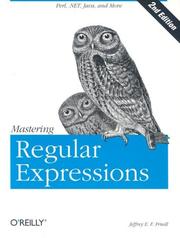
ISBN: 0596002890 Year: 2002 Publisher: Sebastopol O'Reilly
Abstract | Keywords | Export | Availability | Bookmark
 Loading...
Loading...Choose an application
- Reference Manager
- EndNote
- RefWorks (Direct export to RefWorks)
Programming --- Electronic data processing --- Programming languages (Electronic computers) --- Text processing (Computer science) --- AA / International- internationaal --- 654 --- Programmeertalen --- Programmeren --- Processing, Text (Computer science) --- Database management --- Information storage and retrieval systems --- Word processing --- Computer languages --- Computer program languages --- Computer programming languages --- Machine language --- Languages, Artificial --- ADP (Data processing) --- Automatic data processing --- Data processing --- EDP (Data processing) --- IDP (Data processing) --- Integrated data processing --- Computers --- Office practice --- Informatieverwerking. Bureautica. --- Automation --- Electronic data processing. --- Programming languages (Electronic computers). --- Text processing (Computer science). --- Informatieverwerking. Bureautica
Book
ISBN: 907723201X 9077232044 9077232028 9077232052 9077232036 Year: 2002 Publisher: Rotterdam Erasmus Universiteit
Abstract | Keywords | Export | Availability | Bookmark
 Loading...
Loading...Choose an application
- Reference Manager
- EndNote
- RefWorks (Direct export to RefWorks)
Computer architecture. Operating systems
---
#BIBC:ruil
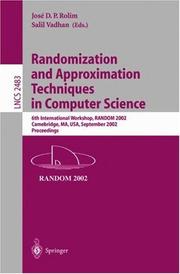
ISBN: 3540441476 3540457267 9783540441472 Year: 2002 Volume: 2483 Publisher: Berlin: Springer,
Abstract | Keywords | Export | Availability | Bookmark
 Loading...
Loading...Choose an application
- Reference Manager
- EndNote
- RefWorks (Direct export to RefWorks)
Computer science --- Statistical methods --- Informatics --- Computer science. --- Computer programming. --- Algorithms. --- Numerical analysis. --- Computer Science. --- Programming Techniques. --- Mathematics of Computing. --- Algorithm Analysis and Problem Complexity. --- Numeric Computing. --- Discrete Mathematics in Computer Science. --- Mathematics. --- Science --- Computer software. --- Electronic data processing. --- Computational complexity. --- Complexity, Computational --- Electronic data processing --- Machine theory --- ADP (Data processing) --- Automatic data processing --- Data processing --- EDP (Data processing) --- IDP (Data processing) --- Integrated data processing --- Computers --- Office practice --- Software, Computer --- Computer systems --- Automation --- Computer science—Mathematics. --- Mathematical analysis --- Algorism --- Algebra --- Arithmetic --- Electronic computer programming --- Electronic digital computers --- Programming (Electronic computers) --- Coding theory --- Foundations --- Programming --- Computer science - Statistical methods - Congresses
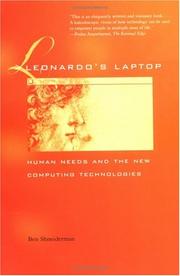
ISBN: 0262256983 0585444994 9780262256988 9780585444994 9780262692991 026225042X 9780262194761 0262194767 0262692996 Year: 2002 Publisher: Cambridge, Mass. MIT Press
Abstract | Keywords | Export | Availability | Bookmark
 Loading...
Loading...Choose an application
- Reference Manager
- EndNote
- RefWorks (Direct export to RefWorks)
"Ben Shneiderman's book dramatically raises computer users' expectations of what they should get from technology. He opens their eyes to new possibilities and invites them to think freshly about future technology. He challenges developers to build products that better support human needs and that are usable at any bandwidth. Shneiderman proposes Leonardo da Vinci as an inspirational muse for the "new computing." He wonders how Leonardo would use a laptop and what applications he would create. Shneiderman shifts the focus from what computers can do to what users can do. A key transformation is to what he calls "universal usability," enabling participation by young and old, novice and expert, able and disabled. This transformation would empower those yearning for literacy or coping with their limitations. Shneiderman proposes new computing applications in education, medicine, business, and government. He envisions a World Wide Med that delivers secure patient histories in local languages at any emergency room and thriving million-person communities for e-commerce and e-government. Raising larger questions about human relationships and society, he explores the computer's potential to support creativity, consensus-seeking, and conflict resolution. Each chapter ends with a Skeptic's Corner that challenges assumptions about trust, privacy, and digital divides."
Electronic data processing. --- Human-computer interaction. --- Technological forecasting. --- Technology --- Computer-human interaction --- Human factors in computing systems --- Interaction, Human-computer --- ADP (Data processing) --- Automatic data processing --- Data processing --- EDP (Data processing) --- IDP (Data processing) --- Integrated data processing --- Forecasting --- Technology transfer --- Human engineering --- User-centered system design --- User interfaces (Computer systems) --- Computers --- Office practice --- Automation --- SCIENCE, TECHNOLOGY & SOCIETY/General --- COMPUTER SCIENCE/Human Computer Interaction --- Computer. Automation --- Electronic data processing --- Human-computer interaction --- Technological forecasting --- Information technology --- Attitude to Computers --- #SBIB:309H1720 --- Attitude to Computer --- Computer, Attitude to --- Computers, Attitude to --- to Computer, Attitude --- to Computers, Attitude --- IT (Information technology) --- Telematics --- Information superhighway --- Knowledge management --- Informatiekunde, informatie management
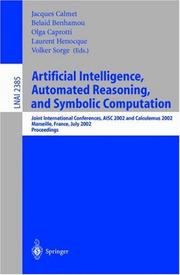
ISSN: 03029743 ISBN: 3540438653 9783540438656 3540454705 Year: 2002 Volume: 2385 Publisher: Berlin: Springer,
Abstract | Keywords | Export | Availability | Bookmark
 Loading...
Loading...Choose an application
- Reference Manager
- EndNote
- RefWorks (Direct export to RefWorks)
Artificial intelligence --- Logic, Symbolic and mathematical --- Automatic theorem proving --- Computer Science --- Engineering & Applied Sciences --- Computer science. --- Mathematical logic. --- Numerical analysis. --- Computer science --- Artificial intelligence. --- Computer Science. --- Artificial Intelligence (incl. Robotics). --- Symbolic and Algebraic Manipulation. --- Numeric Computing. --- Discrete Mathematics in Computer Science. --- Mathematical Logic and Formal Languages. --- Mathematics. --- Algebra --- Electronic data processing. --- Computational complexity. --- Artificial Intelligence. --- Data processing. --- Informatics --- Science --- Complexity, Computational --- Electronic data processing --- Machine theory --- ADP (Data processing) --- Automatic data processing --- Data processing --- EDP (Data processing) --- IDP (Data processing) --- Integrated data processing --- Computers --- Office practice --- AI (Artificial intelligence) --- Artificial thinking --- Electronic brains --- Intellectronics --- Intelligence, Artificial --- Intelligent machines --- Machine intelligence --- Thinking, Artificial --- Bionics --- Cognitive science --- Digital computer simulation --- Logic machines --- Self-organizing systems --- Simulation methods --- Fifth generation computers --- Neural computers --- Automation --- Computer science—Mathematics. --- Algebra of logic --- Logic, Universal --- Mathematical logic --- Symbolic and mathematical logic --- Symbolic logic --- Mathematics --- Algebra, Abstract --- Metamathematics --- Set theory --- Syllogism --- Mathematical analysis --- Artificial intelligence - Congresses --- Logic, Symbolic and mathematical - Congresses --- Automatic theorem proving - Congresses --- Logic, Symbolic and mathematical.
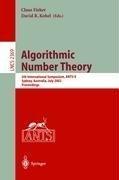
ISBN: 3540438637 3540454551 Year: 2002 Publisher: Berlin, Heidelberg : Springer Berlin Heidelberg : Imprint: Springer,
Abstract | Keywords | Export | Availability | Bookmark
 Loading...
Loading...Choose an application
- Reference Manager
- EndNote
- RefWorks (Direct export to RefWorks)
511.6 --- Algebraic number fields --- Number theory --- Algebra --- Mathematics --- Physical Sciences & Mathematics --- 511.6 Algebraic number fields --- Mathematics. --- Data encryption (Computer science). --- Algorithms. --- Numerical analysis. --- Computer science --- Number theory. --- Number Theory. --- Algorithm Analysis and Problem Complexity. --- Discrete Mathematics in Computer Science. --- Numeric Computing. --- Data Encryption. --- Number study --- Numbers, Theory of --- Computer mathematics --- Discrete mathematics --- Electronic data processing --- Mathematical analysis --- Algorism --- Arithmetic --- Data encoding (Computer science) --- Encryption of data (Computer science) --- Computer security --- Cryptography --- Math --- Science --- Foundations --- Computer software. --- Computational complexity. --- Electronic data processing. --- Cryptology. --- ADP (Data processing) --- Automatic data processing --- Data processing --- EDP (Data processing) --- IDP (Data processing) --- Integrated data processing --- Computers --- Office practice --- Complexity, Computational --- Machine theory --- Software, Computer --- Computer systems --- Automation --- Computer science—Mathematics. --- Data encryption (Computer science)

ISBN: 3540003460 3540363831 Year: 2002 Publisher: Berlin, Heidelberg : Springer Berlin Heidelberg : Imprint: Springer,
Abstract | Keywords | Export | Availability | Bookmark
 Loading...
Loading...Choose an application
- Reference Manager
- EndNote
- RefWorks (Direct export to RefWorks)
Experimental algorithmics, as its name indicates, combines algorithmic work and experimentation: algorithms are not just designed, but also implemented and tested on a variety of instances. Perhaps the most important lesson in this process is that designing an algorithm is but the first step in the process of developing robust and efficient software for applications. Based on a seminar held at Dagstuhl Castle, Germany in September 2000, this state-of-the-art survey presents a coherent survey of the work done in the area so far. The 11 carefully reviewed chapters provide complete coverage of all current topics in experimental algorithmics.
Computer algorithms. --- Data structures (Computer science) --- Application software --- Development of application software --- Information structures (Computer science) --- Structures, Data (Computer science) --- Structures, Information (Computer science) --- Development. --- Computer science. --- Data structures (Computer science). --- Algorithms. --- Numerical analysis. --- Computer science --- Computer Science. --- Computer Science, general. --- Data Structures. --- Algorithm Analysis and Problem Complexity. --- Numeric Computing. --- Discrete Mathematics in Computer Science. --- Mathematics. --- Computer mathematics --- Discrete mathematics --- Electronic data processing --- Mathematical analysis --- Algorism --- Algebra --- Arithmetic --- File organization (Computer science) --- Abstract data types (Computer science) --- Informatics --- Science --- Mathematics --- Foundations --- Algorithms --- Computer algorithms --- Development --- Data structures (Computer scienc. --- Computer software. --- Electronic data processing. --- Computational complexity. --- Complexity, Computational --- Machine theory --- ADP (Data processing) --- Automatic data processing --- Data processing --- EDP (Data processing) --- IDP (Data processing) --- Integrated data processing --- Computers --- Office practice --- Software, Computer --- Computer systems --- Automation --- Computer science—Mathematics.

ISBN: 3540441867 3540457534 9783540441861 Year: 2002 Volume: 2462 Publisher: Berlin: Springer,
Abstract | Keywords | Export | Availability | Bookmark
 Loading...
Loading...Choose an application
- Reference Manager
- EndNote
- RefWorks (Direct export to RefWorks)
Computer science --- Statistical methods --- Informatics --- Computer science. --- Computer programming. --- Computers. --- Algorithms. --- Numerical analysis. --- Mathematical optimization. --- Computer Science. --- Programming Techniques. --- Theory of Computation. --- Optimization. --- Algorithm Analysis and Problem Complexity. --- Discrete Mathematics in Computer Science. --- Numeric Computing. --- Mathematics. --- Science --- Information theory. --- Computer software. --- Computational complexity. --- Electronic data processing. --- ADP (Data processing) --- Automatic data processing --- Data processing --- EDP (Data processing) --- IDP (Data processing) --- Integrated data processing --- Computers --- Office practice --- Complexity, Computational --- Electronic data processing --- Machine theory --- Software, Computer --- Computer systems --- Optimization (Mathematics) --- Optimization techniques --- Optimization theory --- Systems optimization --- Mathematical analysis --- Maxima and minima --- Operations research --- Simulation methods --- System analysis --- Communication theory --- Communication --- Cybernetics --- Automation --- Computer science—Mathematics. --- Algorism --- Algebra --- Arithmetic --- Automatic computers --- Automatic data processors --- Computer hardware --- Computing machines (Computers) --- Electronic brains --- Electronic calculating-machines --- Electronic computers --- Hardware, Computer --- Calculators --- Cyberspace --- Electronic computer programming --- Electronic digital computers --- Programming (Electronic computers) --- Coding theory --- Foundations --- Programming --- Computer science - Statistical methods - Congresses --- Discrete mathematics. --- Numerical Analysis. --- Discrete mathematical structures --- Mathematical structures, Discrete --- Structures, Discrete mathematical --- Numerical analysis

ISBN: 3540441808 9783540441809 3540457496 Year: 2002 Volume: 2461 Publisher: Berlin: Springer,
Abstract | Keywords | Export | Availability | Bookmark
 Loading...
Loading...Choose an application
- Reference Manager
- EndNote
- RefWorks (Direct export to RefWorks)
This volume contains the 74 contributed papers and abstracts of 4 of the 5 invited talks presented at the 10th Annual European Symposium on Algorithms (ESA 2002), held at the University of Rome “La Sapienza”, Rome, Italy, 17-21 September, 2002. For the ?rst time, ESA had two tracks, with separate program committees, which dealt respectively with: – the design and mathematical analysis of algorithms (the “Design and An- ysis” track); – real-world applications, engineering and experimental analysis of algorithms (the “Engineering and Applications” track). Previous ESAs were held in Bad Honnef, Germany (1993); Utrecht, The Neth- lands (1994); Corfu, Greece (1995); Barcelona, Spain (1996); Graz, Austria (1997); Venice, Italy (1998); Prague, Czech Republic (1999); Saarbruc ¨ ken, Ger- ? many (2000), and Arhus, Denmark (2001). The predecessor to the Engineering and Applications track of ESA was the Annual Workshop on Algorithm En- neering (WAE). Previous WAEs were held in Venice, Italy (1997), Saarbruc ¨ ken, ? Germany (1998), London, UK (1999), Saarbru ¨cken, Germany (2000), and Arhus, Denmark (2001). The proceedings of the previous ESAs were published as Springer LNCS volumes 726, 855, 979, 1284, 1461, 1643, 1879, and 2161. The proceedings of WAEs from 1999 onwards were published as Springer LNCS volumes 1668, 1982, and 2161.
Computer algorithms --- Computer science. --- Computer programming. --- Data structures (Computer science). --- Algorithms. --- Numerical analysis. --- Computer science --- Computer graphics. --- Computer Science. --- Programming Techniques. --- Algorithm Analysis and Problem Complexity. --- Discrete Mathematics in Computer Science. --- Numeric Computing. --- Data Structures. --- Computer Graphics. --- Mathematics. --- Computer software. --- Computational complexity. --- Electronic data processing. --- Data structures (Computer scienc. --- ADP (Data processing) --- Automatic data processing --- Data processing --- EDP (Data processing) --- IDP (Data processing) --- Integrated data processing --- Computers --- Office practice --- Complexity, Computational --- Electronic data processing --- Machine theory --- Software, Computer --- Computer systems --- Automatic drafting --- Graphic data processing --- Graphics, Computer --- Computer art --- Graphic arts --- Engineering graphics --- Image processing --- Informatics --- Science --- Automation --- Digital techniques --- Computer science—Mathematics. --- Information structures (Computer science) --- Structures, Data (Computer science) --- Structures, Information (Computer science) --- File organization (Computer science) --- Abstract data types (Computer science) --- Mathematical analysis --- Algorism --- Algebra --- Arithmetic --- Electronic computer programming --- Electronic digital computers --- Programming (Electronic computers) --- Coding theory --- Foundations --- Programming --- Computer algorithms - Congresses --- Data structures (Computer science)
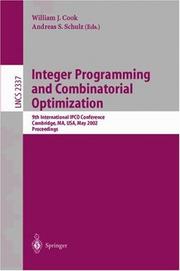
ISSN: 03029743 ISBN: 3540436766 9783540436768 3540478671 Year: 2002 Volume: 2337 Publisher: Berlin: Springer,
Abstract | Keywords | Export | Availability | Bookmark
 Loading...
Loading...Choose an application
- Reference Manager
- EndNote
- RefWorks (Direct export to RefWorks)
This volume contains the papers selected for presentation at IPCO 2002, the NinthInternationalConferenceonIntegerProgrammingandCombinatorial- timization, Cambridge, MA (USA), May 27–29, 2002. The IPCO series of c- ferences highlights recent developments in theory, computation, and application of integer programming and combinatorial optimization. IPCO was established in 1988 when the ?rst IPCO program committee was formed. IPCO is held every year in which no International Symposium on Ma- ematical Programming (ISMP) takes places. The ISMP is triennial, so IPCO conferences are held twice in every three-year period. The eight previous IPCO conferences were held in Waterloo (Canada) 1990, Pittsburgh (USA) 1992, Erice (Italy) 1993, Copenhagen (Denmark) 1995, Vancouver (Canada) 1996, Houston (USA) 1998, Graz (Austria) 1999, and Utrecht (The Netherlands) 2001. In response to the call for papers for IPCO 2002, the program committee received 110 submissions, a record number for IPCO. The program committee met on January 7 and 8, 2002, in Aussois (France), and selected 33 papers for inclusion in the scienti?c program of IPCO 2002. The selection was based on originality and quality, and re?ects many of the current directions in integer programming and combinatorial optimization research.
Integer programming --- Combinatorial optimization --- Computer science. --- Software engineering. --- Computers. --- Algorithms. --- Numerical analysis. --- Computer science --- Probabilities. --- Computer Science. --- Theory of Computation. --- Probability Theory and Stochastic Processes. --- Software Engineering/Programming and Operating Systems. --- Discrete Mathematics in Computer Science. --- Numeric Computing. --- Algorithm Analysis and Problem Complexity. --- Mathematics. --- Programming (Mathematics) --- Information theory. --- Distribution (Probability theory. --- Computational complexity. --- Electronic data processing. --- Computer software. --- Software, Computer --- Computer systems --- ADP (Data processing) --- Automatic data processing --- Data processing --- EDP (Data processing) --- IDP (Data processing) --- Integrated data processing --- Computers --- Office practice --- Complexity, Computational --- Electronic data processing --- Machine theory --- Computer software engineering --- Engineering --- Distribution functions --- Frequency distribution --- Characteristic functions --- Probabilities --- Communication theory --- Communication --- Cybernetics --- Automation --- Computer science—Mathematics. --- Algorism --- Algebra --- Arithmetic --- Mathematical analysis --- Probability --- Statistical inference --- Combinations --- Mathematics --- Chance --- Least squares --- Mathematical statistics --- Risk --- Automatic computers --- Automatic data processors --- Computer hardware --- Computing machines (Computers) --- Electronic brains --- Electronic calculating-machines --- Electronic computers --- Hardware, Computer --- Calculators --- Cyberspace --- Foundations --- Integer programming - Congresses --- Combinatorial optimization - Congresses
| Listing 1 - 10 of 17 | << page >> |
Sort by
|

 Search
Search Feedback
Feedback About UniCat
About UniCat  Help
Help News
News